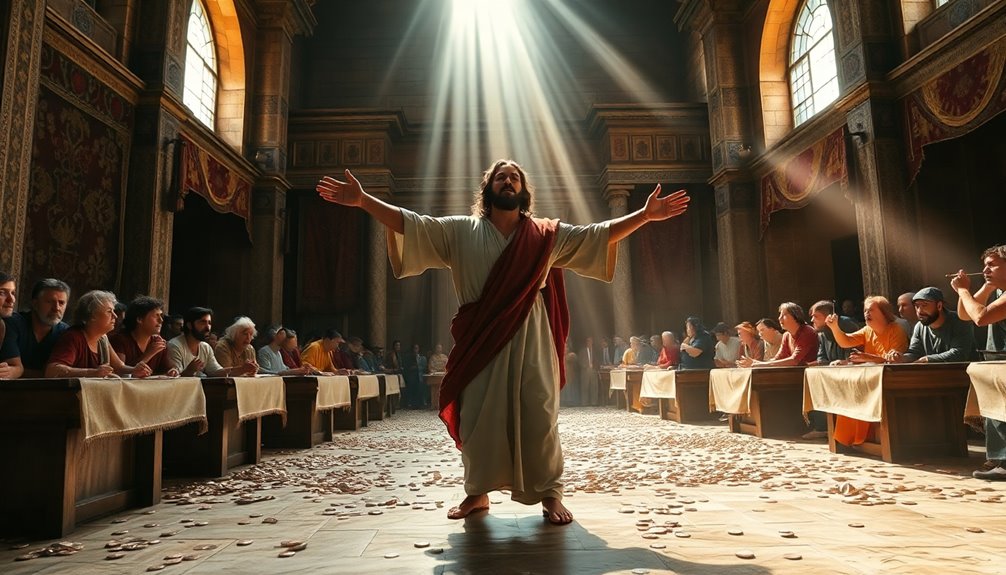When Jesus cleansed the temple, He passionately asserted its purpose as a house of prayer, driving out merchants and money changers with zeal. This act reflected His commitment to authentic worship, echoing the righteous anger seen in Psalm 69:9. His actions remind you to examine distractions in your worship and prioritize your relationship with God. Embracing this passion can inspire a deeper commitment to honoring the sanctity of worship. Discover more about the significance of this event and its implications.
As Jesus stormed into the temple during the Jewish Passover, He drove out the merchants and money changers with a fierce determination. His intense zeal for God's house shone brightly as He declared that the temple should be a house of prayer rather than a den of robbers. You can almost picture the scene: Jesus weaving a whip of cords, asserting His authority with every crack, emphasizing the importance of cleansing this sacred space. The temple, after all, was meant to be a dwelling place for worship, a reflection of divine holiness amidst the bustling activities of the Passover.
In that moment, His disciples witnessed a profound act of righteous anger, one that mirrored the deep concern for purity expressed by David in Psalm 69:9. Just as David faced scorn for his zeal, Jesus confronted the corruption that had invaded the temple. It wasn't just about the physical space; it was about the very essence of worship that was being compromised.
As you reflect on this, consider how often distractions creep into your own worship practices. Are you focused on God, or are you allowing commercialism and corruption to take precedence?
Jesus' actions that day served as a powerful reminder of the significance of maintaining the sanctity of worship. He wasn't merely defending a physical structure; He was foreshadowing His own role as the new temple. When He spoke of His body, He indicated that the ultimate fulfillment of God's presence among His people wouldn't be confined to bricks and mortar. His body would become the living temple, the embodiment of divine communion.
This incident invites you to examine your own heart. How do you approach worship? Are you entering with reverence, or have you, like the money changers, allowed worldly distractions to infiltrate your sacred space?
Jesus' cleansing of the temple challenges you to prioritize your relationship with God above all else. Let His passion inspire you to cultivate a worship environment that honors Him, free from the clutter of greed and superficiality.
Ultimately, Jesus' fierce determination to cleanse the temple calls believers to a deeper commitment to authentic worship. His zeal serves as a guide, prompting you to ensure that your worship reflects the purity and devotion that God desires. Embrace that call, and let your worship be a true reflection of your love for Him.
Frequently Asked Questions
What Did Jesus Mean by Zeal for Your House Will Consume Me?
When Jesus said, "zeal for your house will consume me," he expressed an intense passion for God's honor and purity.
It means he's deeply committed to ensuring that worship remains genuine and sacred.
This zeal drives you to reflect on your own devotion and the sanctity of your worship spaces.
You're called to maintain a heart that prioritizes God's purposes, ensuring your worship is sincere and focused on Him above all else.
What Did Jesus Mean by Cleansing the Temple?
When Jesus cleansed the temple, He demonstrated His passion for true worship and the sanctity of God's space.
By driving out merchants and money changers, He confronted the corruption that had taken root, emphasizing that the temple should be a place for prayer and reverence.
This act wasn't just about physical cleansing; it was a call to return to genuine faith, reminding you that worship should be pure and focused on God.
What Does Zeal Mean in John 2 17?
When you think of zeal in John 2:17, picture a fiery devotion, like a passionate flame igniting a spark of righteousness.
It's not just enthusiasm; it's a deep commitment to what's sacred.
This kind of fervor drives you to protect and honor God's presence, reflecting a heart that can't stand for anything less than purity and reverence.
That intense desire ultimately compels you to take action for the things you hold dear.
What Is the Moral Lesson of John 2:13-22?
The moral lesson of John 2:13-22 emphasizes the importance of prioritizing genuine worship over commercial interests.
You're reminded that sacred spaces should reflect reverence and devotion, not distraction or exploitation.
It warns against allowing the purity of worship to be tainted by greed or self-interest.
Conclusion
As you stand before the temple, you can almost feel the tension in the air. Jesus, with fire in His eyes, challenges the corruption that has seeped into this sacred space. You can't help but wonder what will happen next. Will He drive them all out? The energy is electric, and you're on the edge of your seat, captivated by the unfolding drama. In that moment, you realize His zeal for God's house is just beginning to ignite a revolution.










